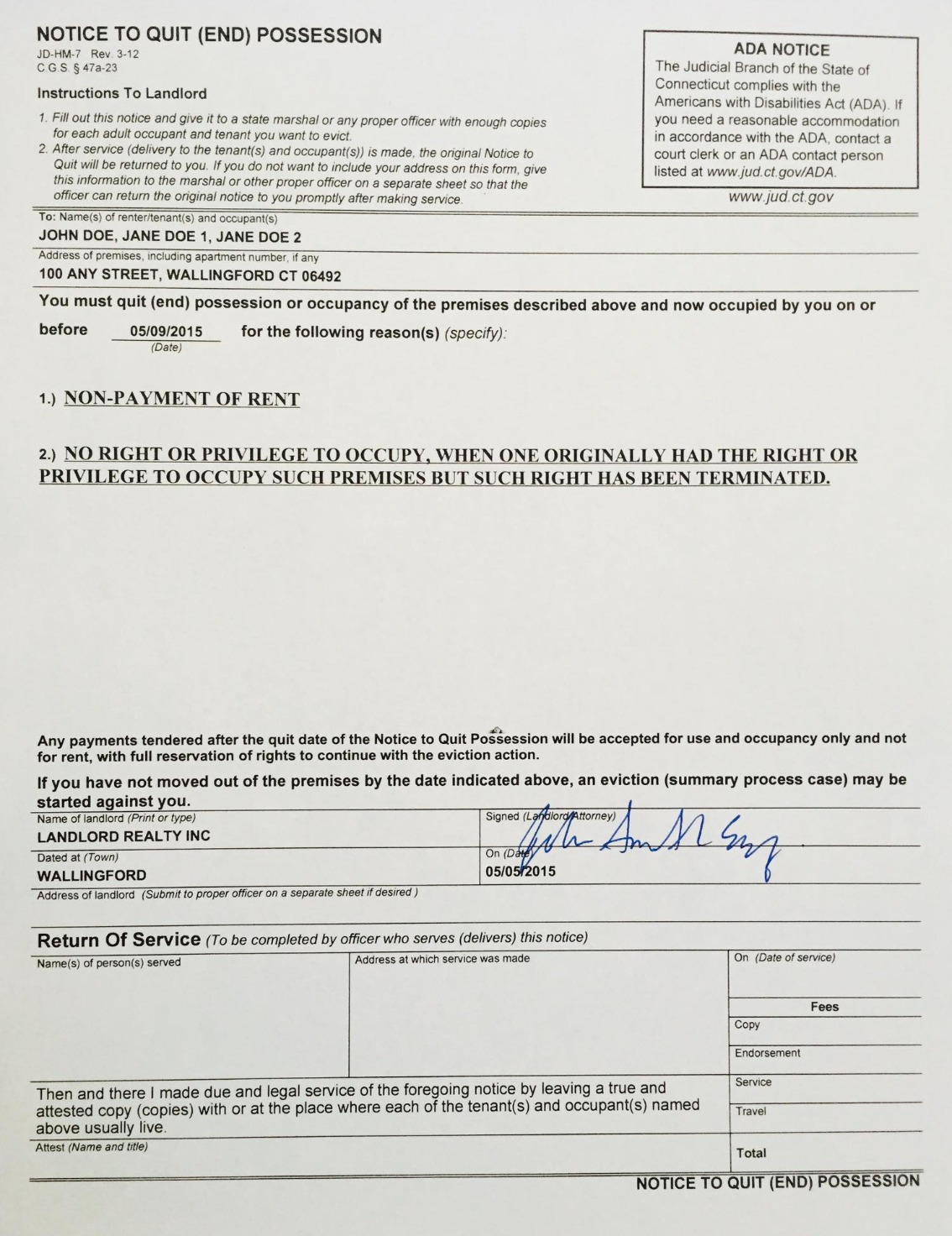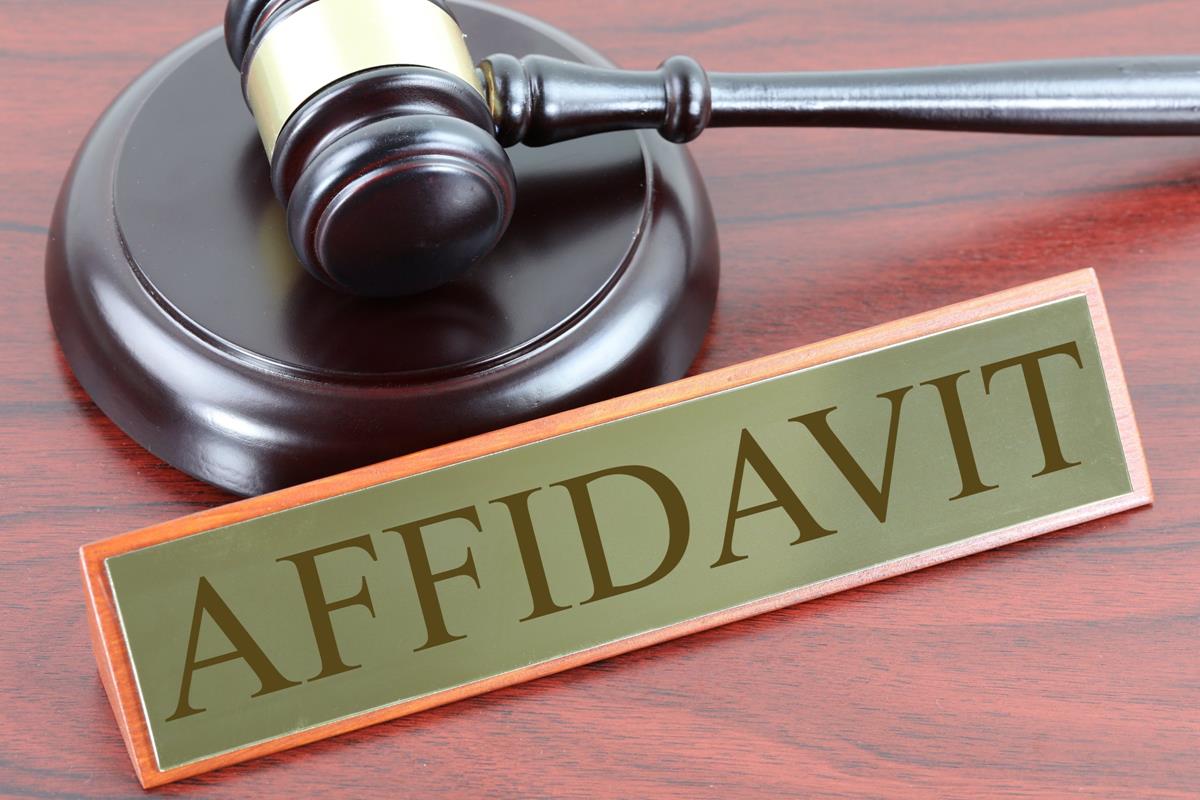Your CT State Marshal, delivering fast, reliable, professional service of Civil Process in New Haven County.
Evictions
Manage Your Property
State Marshal Brian Mezick knows that time is your primary concern as a landlord when involved in an eviction case. Marshal Mezick can assist you with prompt service of process to move your eviction case along as soon as possible. Call today (203) 684-3100
Note: The following should not be construed as legal advice. The following is general information about a State Marshal’s involvement in an eviction. This information may assist you in a summary process eviction case and is publicly available at A Landlords Guide to Summary Process (Eviction) (JDP-HM-14) and the Connecticut General Statues. Legal questions should be directed to a licensed attorney. A State Marshal can ensure proper service of process required in an eviction matter, and is the only authorized official to serve a Summary Process (Eviction) Execution, which is necessary for the removal of a tenant and personal items from the property.
Evictions
Expiration of Execution Orders
Executive Order 12D as extended by Executive Order 14A expired on February 15, 2022. Further, H.B. 5047 did not extend the provisions of the Executive Order 12D, Sections 1 through 3. See House Amendment Schedule C of HB 5047.
This means landlords are NO longer required to:
– attach the Unite CT forms in English & Spanish.
– put a Unite CT receipt number on Notices to Quit for non payment cases.
– put 30 days on a Notice to Quit

Evictions: Links and Resources from (now expired as of 2/15/22) Executive Order requirements
Lamont Executive Order 10A
Lamont Executive Order 11 (extends the provisions of 10A through 5/20/21)
Lamont Executive Order 12B (extended the provisions of EO 10 through June 30, 2021)
Lamont Executive Order 12D (changed the eviction process through JULY 21, 2021.)
Lamont Executive Order 13 (extends the procedures in EO 12D through SEPTEMBER 30, 2021.)
Lamont Executive Order 14A (extends the procedures in EO 12D through FEBRUARY 15, 2022.)
UniteCT English Flyer
UniteCT Spanish Flyer
State of CT- Homeowner’s & Renter Info
CDC Declaration English- expires 2/28/2022
CDC Declaration Spanish- expires 2/28/2022
For general information about the eviction process, please see below. For more complicated questions, you will likely need to consult and attorney or seek further guidance from the Housing Court.
Evictions
Notice to Quit
The first step in the Summary Process (Eviction) procedure is the Notice to Quit Possession.
JD-HM-7 Notice to Quit (End) Possession
The Notice to Quit must be completed with the exact name and address, including the apartment number, floor number or other designation, if any, of each adult tenant you want to evict and must be signed by you as the plaintiff/landlord. The Plaintiff/Landlord should be properly described as the person/entity holding title to the property.
When submitting a Notice to Quit for service, you must provide the State Marshal an original Notice to Quit Possession and sufficient additional copies for each tenant who lives there. You should also keep 1 (one) copy for your own records.
You must state a reason on the Notice to Quit. The most frequently used reasons for evictions are nonpayment of rent and termination of lease by lapse of time. The Connecticut General Statutes also provide for other reasons to commence a summary process eviction, per CGS 47a-23. Evictions for other reasons than non-payment or lapse of time are more complex.

Always include in the Notice to Quit Possession the names of all adults living in the premises. If you know that there are adults living in the premises, but you do not know their names, you may characterize them as John and/or Jane Doe, as appropriate. Every adult occupant (18 years or older) of the premises must be listed on the NTQ regardless if they are listed on the lease. Only those parties named will be bound by any judgment obtained in the eviction.
In any eviction, the Notice to Quit must allow the tenant at least 3 (three) full days in which to move. This means that there must be 3 (three) full intervening days between the date the Notice to Quit is served on your tenant(s) and the last day specified in the Notice to Quit for the tenant to vacate the premises.
The first and last days are not counted in computing the 3 (three) days. (For example, if the Notice specifies that the tenant must move out by May 15, the State Marshal must serve the Notice no later than May 11.)
In all cases, the tenants have until midnight of the last day given to them in the Notice to Quit to vacate the premises before you can proceed with the Summons and Complaint, as explained below.
All Notices to Quit must be served with the Right to Counsel Form attached in accordance with Public Act 21-34.
Month to Month Tenancy
In nonpayment of rent situations which involve oral or written month-to month tenancies, the Notice to Quit cannot be served until the tenth day after the date the rent was due, not counting the due date. (For example, if the rent is due on May 1, the Notice to Quit cannot be served until May 11.)
However, the Notice to Quit may also be served during the month immediately following the nonpayment of rent in a month-to-month tenancy. (For example, if the rent due on May 1 is not paid, the Notice to Quit may be served at any time from May 11 through the end of June.)

Lapse of Time
In cases when an oral or written lease has terminated by lapse of time (“without cause eviction”), the tenant must be given at least 3 (three) full days and at least until the end of the time period to which he or she would normally have been entitled to vacate the premises. (For example, in an oral month-to month situation running from May 1 to May 31, if the Notice to Quit is served no later than May 27, it must give the tenant at least until the last day of the month, which is May 31 in this case. If, however, the Notice to Quit is not served until May 28, it must give the tenant until June 1 to vacate.)
Landlords should consider also listing the following statutory disclaimer at the bottom of the Notice to Quit:
“Any payments tendered after the date specified to quit possession or occupancy, or the date of the completion of the pretermination process if that is later, will be accepted for use and occupancy only and not for rent, with full reservation of rights to continue with the eviction action”
The Notice to Quit must be formally served. Service by a State Marshal will satisfy this requirement. The fee charged by a State Marshal for service is set by statute. Please call for a quote for service. After the State Marshal serves the Notice to Quit, the original will be returned to you, with the State Marshal’s signature, indicating that service was made. This is known as the State Marshal’s Return of Service.

Evictions
Summons & Complaint
If your tenant still has not moved after the last day given in the Notice to Quit, you must return to the clerk’s office if you are a self-represented party, with the original Notice to Quit, the State Marshal’s Return of Service, and a completed Summons and Complaint.
JD-HM-32 Summons form
JD-HM-8 Complaint issued for nonpayment of rent
JD-HM-20 for a Complaint issued for termination of lease by lapse of time
Housing Court locations- where to file
You must personally return to the court with your completed Summons and Complaint for the clerk’s signature on the Summons if you are self-represented. Also, bring the original Notice to Quit with the State Marshal’s Return of Service. Be sure to indicate in numbers 1 (one) and 3 (three) of either Complaint whether it is an oral or written week-to-week, month-to-month or year’s lease.
The clerk will set the return date on the Summons. The return date is a date from which certain time periods are measured, such as when the defendant must file an Appearance or a Pleading (Response). The return date in a Summary Process case can be any day of the week except Sundays and holidays. It is not necessary for you to appear in court on the return date because there will be no hearing on that date.

After the clerk sets the return date and signs the Summons, you should keep 1 (one) copy of all papers for yourself and give the original and sufficient copies for each defendant to the State Marshal, who will serve a copy on each defendant and return the original to you. The fee charged by a State Marshal for service is set by statute. Please call for a quote for service.
Once the State Marshal returns the original Summons and Complaint to you with the Return of Service noted, you must file them at the clerk’s office with the original Notice to Quit, at least 4 (four) days before the return date on the Summons. When filing these papers, you must pay an entry fee to the clerk. Currently, this fee is $175.00. Payment must be made at the time of filing by cash or check payable to Clerk, Superior Court.
All Summary Process papers must be served with the Right to Counsel Form attached in accordance with Public Act 21-34.
Evictions
Military Affidavit
After your case is returned to court, any non-appearing parties must be defaulted for failure to appear, in order for your case to proceed. The Housing Court will require you to submit a Military Affidavit with facts stating that no defendant(s) in this action is (are) in the military or naval service of the United States. The Military Affidavit must state facts showing the defendant(s) is (are) not in military service and must state the source of the knowledge of these facts, and must be stated using personal knowledge.
State Marshal Brian Mezick can provide you a military affidavit for use in your Summary Process (Eviction) case, through information obtained either at the time of service or through search tools at his disposal.

Evictions
Execution (Removal)
After your case If a judgment for immediate possession is entered in your favor, either by default or after a hearing, the defendant has a 5 (five)-day Stay of Execution, not counting intervening Sundays, legal holidays, or the date of judgment.
If the defendant has not vacated the premises after the 5 (five) full days expire, you may obtain from the clerk’s office a Summary Process Execution.
Document Links:
- JD-HM-2 Execution for Possession- residential
- JD-HM-034 Execution for Possession- non-residential/commercial
The Execution must be completed by you and given to the clerk for signature. After the Execution is returned to you, you must give it to the State Marshal for service on the defendant. A State Marshal is the only authorized official to serve a Summary Process (Eviction) Execution, which is necessary for the removal of a tenant(s) and personal items from the property.
The Execution informs the defendant that they must vacate the premises within a minimum of 24 (twenty-four) hours or be physically removed from the premises. The State Marshal serves this notice and schedules the eviction. If the defendant does not move, the defendant’s possessions and personal effects they will be removed by the State Marshal and stored at a storage facility designated by the municipality. If the defendant does not claim those belongings, they may be sold by the town or destroyed. Or in the case of a commercial eviction, the commercial property will be locked down under the supervision of the State Marshal and if such possessions and personal effects are not removed in 15 days they will be forfeited to the landlord, pursuant to CGS 47a-42a.

Fees for service of a Summary Process Execution includes service of the eviction notice, and a marshal’s hourly rate for removal, currently set by statute. Other fees include the hourly cost of the movers, locksmith if applicable, and cost of moving supplies. The total price is determined by time spent to complete the eviction. We cannot estimate the time required to conduct an eviction as each situation is unique and the eviction must be conducted in accordance with the General Statutes to its completion, which involves removing the tenant and all his or her possessions and personal effects and properly transporting and turning them over to the town or city.
All eviction execution removals require pre-payment of a deposit retainer amount from the landlord before we can conduct the eviction. Once you have a signed execution from the court, please bring the execution to our office and we can begin the eviction process. We generally can get your eviction scheduled as soon as possible.
Frequently Asked Questions: COMING SOON...
Note: The preceding should not be construed as legal advice. The preceding was general information about a State Marshal’s involvement in an eviction. This information was provided to assist you in a summary process eviction case and is publicly available at A Landlords Guide to Summary Process (Eviction) (JDP-HM-14) and the Connecticut General Statues. Legal questions should be directed to a licensed attorney. A State Marshal ensures execution of proper service of process required in an eviction matter, and a State Marshal is the only authorized official to serve a Summary Process (Eviction) Complaint and also serve an Execution, which is necessary for the removal of a tenant and personal items from the property.